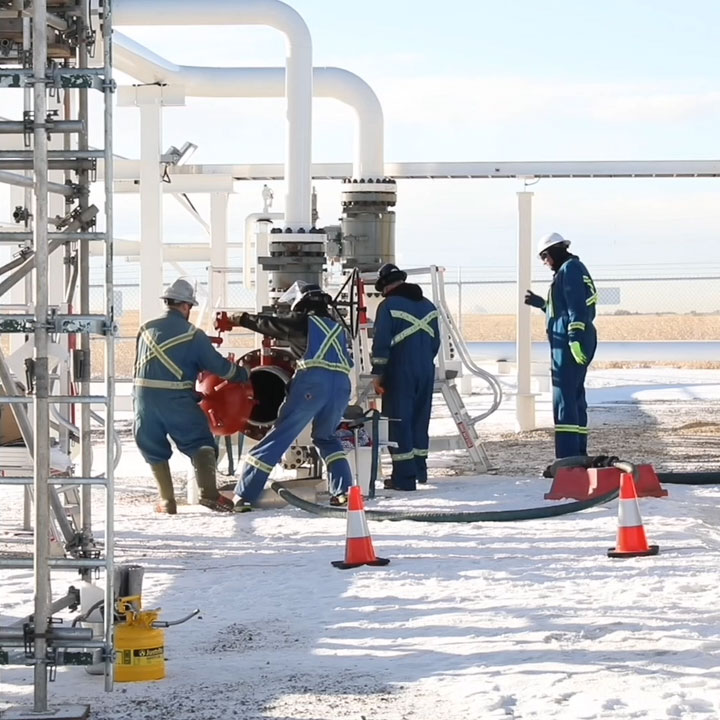
Trans-Northern Pipelines Inc. (TNPI) has adopted the Incident Command System (ICS) structure to manage emergencies. ICS is a standardized on-site management system designed to enable effective, efficient incident management.
Initial Incident Commander
In the ICS structure, the first person on the scene of an emergency becomes the Initial Incident Commander. Their role is to evaluate the incident, establish an Incident Command Post and assess the need for additional resources including activating the Incident Management Team which may include TNPI employees and third-party contractors as well as emergency responders, Indigenous communities, government agencies and regulators.
In the unlikely event of an emergency involving a TNPI pipeline, the Incident Management Team will operate under a Single Command structure or a Unified Command Structure.
Command Structures
Under Single Command, there is one Incident Commander. This is typically the case for smaller incidents, involving only TNPI’s facilities and when few, if any regulators or outside agencies are involved. A larger scale incident will commonly transition from Unified Command to Single Command once the initial emergency has concluded and the company is moving to remediation.
Under Unified Command, decisions are made by two or more jurisdictions. For example, TNPI and a regulatory agency. Unified Command is required when incident management requires decisions to be made by more than one jurisdiction. Once joint decisions have been made, one member is identified to speak for the Unified Command Team. In Unified Command, TNPI will assume the role of the Responsible Party (RP), working closely with all agencies to ensure a safe and effective response
Phases of ICS Events
There are two phases for ICS events: the Initial Response Phase, followed by a Proactive Phase for longer term events. During the Initial Response Phase (first 0-48 hours), TNPI will have an Initial Incident Commander (IC) at the site of the event. Part of the IC’s role is to meet with any responding agencies, such as fire, police, and medical, and coordinate TNPI’s support of the ongoing emergency management of the event. That support will include subject matter expertise (on our pipeline, operations and products), as well as additional resources (trained response personnel and equipment).
TNPI will continue to co-ordinate emergency response activities with the responding agencies while the TNPI Emergency Response Team members continue to arrive and staff our Incident Command Post (ICP). A fully staffed ICP, in most cases, is not required for shorter duration events, such as a small fire or small release.
During the Proactive Phase (49+ hours), TNPI and the responding agencies/communities will set up a fully staffed Incident Command Post (ICP) at or near the site. TNPI will form a Unified Command to ensure the response is managed in a safe, effective and responsible manner.
Area Command
For complex incidents, an Area Command may be established. Area Command is used to oversee the management of multiple incidents or a large-scale incident with multiple incident management teams in use. The Area Command focuses primarily on strategic assistance, oversight and direction to help manage the overall incident resources. During an Area Command, TNPI will maintain the Unified Command at the site ICP while assigning an individual to join the Area Command. Typically, Area Command is used when municipal, provincial or federal Emergency Operations Centers are activated to support the incident.
Emergency Response Actions
In the rare event that an emergency occurs, TNPI will respond by sending technicians who are trained in emergency response procedures to the site of the emergency. Local First Responders are usually the first on site, and TNPI will meet with the First Responders to plan further response actions. TNPI will ensure all appropriate notifications related to the event have been made.
Emergency Response Teams
TNPI has established regional Emergency Response Teams (Alberta, Ontario, Quebec). The individuals who are part of these teams have been assigned ICS roles based on their skills and training. These teams would be activated and populate the Incident Command Post. These teams may also be requested to provide support across geographic boundaries.
Emergency Management Objectives
TNPI will locate the exact site of the event (spill, fire, security event, etc.) and commence its emergency management objectives. The specific objectives will be determined by the Incident Commander or Unified Command, as established. All objectives fall under three general categories: Life Safety; Stabilization of the Event; and Minimization of Impacts from the Event.

